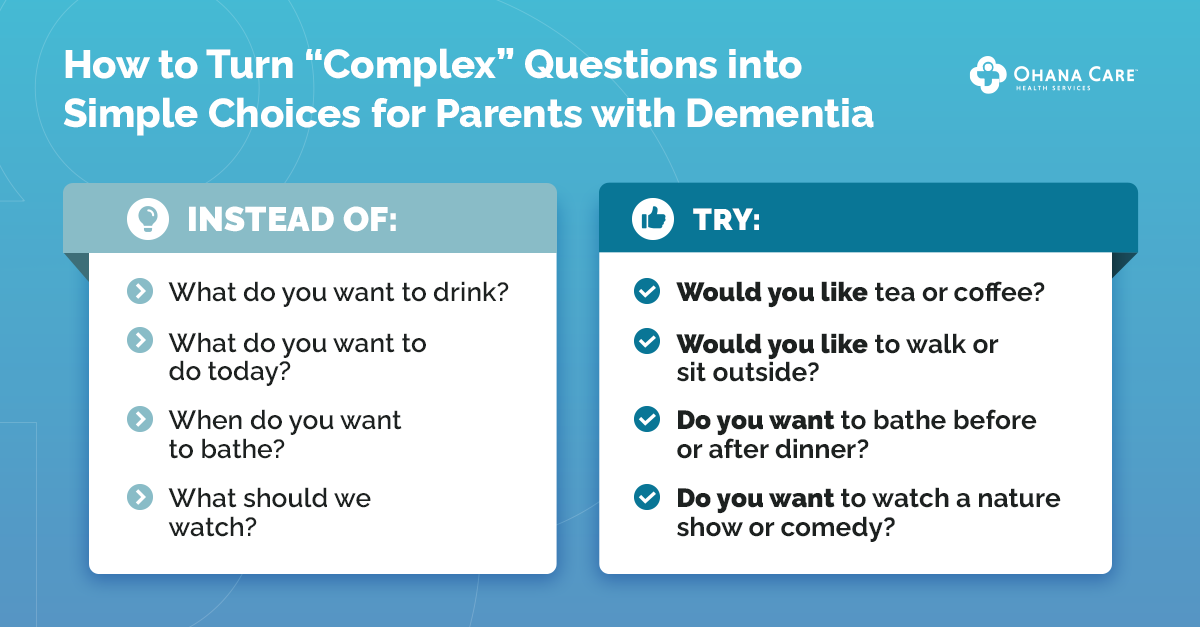According to the Alzheimer’s Society of Canada, approximately 733,040 individuals in Canada are living with a form of dementia.
If your parent is one of those living with Alzheimer’s or dementia, you’re not alone on this journey–even though it can often feel that way.
It can be very emotionally overwhelming when watching your loved one’s behaviours, communication styles, and personality change from what and who you know.
It’s normal to feel the connection you once had slip away as your parent becomes forgetful, easily agitated, or distant toward you and other friends or family.
However, maintaining a deep and loving relationship during this time is still possible. In this article, we’ve listed 12 positive communication tips you can use to maintain a great bond with your parents and ensure they feel loved, understood, and cared for during their journey with Alzheimer’s disease.
1. Stay Calm and Patient
At times, you may notice your parent experience “outbursts” due to them having trouble communicating their thoughts and feelings, which can cause frustration; this may occur when they:
- Can’t remember something that they commonly would remember
- Feel confused by a change in routine
- Struggle to find the right words, like trying to ask for the remote but saying “the TV thing”
- Get overwhelmed by too much information, such as being asked multiple questions at once
- Have difficulty finding something
- Feel ignored or dismissed
To avoid or de-escalate these frustrations, always take a deep breath, stay calm, and be patient with your parent. This may sound like:
- “It’s okay, let’s try to figure this out together.”
- “I understand that must be frustrating. I’m here to help.”
- “Don’t rush. We have time.”
- “I empathize with how you’re feeling. We’ll get through this together.”
2. Use Short and Simple Sentences
When talking to your parent, keep your language clear and concise, as using complex explanations may make them feel overwhelmed.
Here’s an example of a complex sentence and how you can simplify it:
Complex sentence: “Mom, I need you to go get your shoes, grab your coat from the hallway closet, and make sure you bring your purse because we’re running late for the doctor’s appointment.”
Simple sentence: “Mom, let’s get your shoes and coat. We’re going to the doctor now.”
3. Maintain Eye Contact and Use Non-Verbal Communication
The phrase “actions speak louder than words” is highly relevant when communicating with your parent with Alzheimer’s. Since the disease can make verbal communication difficult, your body language becomes essential in conveying love, reassurance, and understanding.
Here are some visual cues that can be very positive during your conversations:
- Holding their hand to offer reassurance and create a sense of closeness
- Patting them gently on the back or shoulder to communicate support
- Maintaining eye contact to show that you’re present and engaged
- Smiling to create a calming atmosphere
- Nodding as they speak to acknowledge their spoken words
- Sitting beside them instead of across from them to feel more connected, like you’re on the same team
4. Avoid Arguing or Correcting
If your loved one says something to you that is out of pocket or incorrect, don’t argue or correct their truth. Instead, casually steer the conversation to redirect their attention while still responding to the emotions behind their words.
For example, if your parent says, “I need to go pick up the kids from school,” but they have adult children, instead of saying, “Your kids are all grown up. There is no need to pick them up,” you could respond with, “What a thoughtful idea. You always made sure they were safe. How about we sit down and have some tea before we think about the next thing to do?”
When you stay positive and reassure your parent of their feelings, you can reduce frustration and anxiety for both you and your loved one.
5. Ask One Question at a Time
Asking multiple questions at once can be overwhelming for a person with dementia or Alzheimer’s. Try to ask one clear question at a time and give them a few moments to respond.
For example, instead of saying, “How hungry are you? Do you want to eat now or later?” try asking, “Are you hungry?” followed by “Would you like some soup?”
6. Use Positive, Reassuring Language
Did you know that 40-50% of people with dementia experience depression at some point?
To reduce feelings of depression and anxiety in your parent, try to use positive language that makes them feel reassured, safe, and comfortable, such as:
- “I’m here for you.”
- “Everything is okay.”
- “You’re safe.”
- “Let’s figure this out together.”
7. Limit Distractions
When communicating with your loved one, try to do so in a quiet, calm environment. Excessive stimulation, such as TV or music while talking, can make it harder for them to focus.
If your loved one starts speaking during a show, consider pausing the TV until the conversation has concluded. This tip will allow them to focus on a particular topic and show that you are paying attention to them.
8. Allow Time for Responses
When you have a conversation with your parent, speak slowly and give them extra time to process what you are saying. When you expect a quick answer, you can cause stress, confusion, or anxiety in your parent, especially as the disease progresses.
9. Focus on Feelings, Not Facts
According to the Alzheimer’s Association, those in the middle to late stages of Alzheimer’s can experience delusions, where they believe things that are not factual.
For example, they may say something you think is absurd, like, “My neighbours are sneaking into my house and stealing my forks.”
You may feel the need to double-check the situation and actually check the cutlery drawer. But if you see the neighbour isn’t stealing from your parent, don’t correct them; rather, allow them to express their opinion and consider the emotion rooted in the sentence.
A good response may be, “Why do you feel that way?” Something more serious could be happening, such as them not feeling safe in their current environment.
10. Offer Choices, But Keep Them Simple
Giving your parent a sense of control is important, but too many options can confuse them. Here are some questions you may ask your parent and suggestions for how you can keep the questions simple:

This approach will reduce the cognitive load for your parent while still giving them a sense of choice and control.
11. Adapt to Their Communication Style
Communication styles can change over time. If you notice your parent struggles with verbal communication, change the way you communicate with them, such as showing them photos of family members, listening to music, or using facial expressions.
Here are a few additional ways you can connect with your parent that may work best with their personal communication style:
- Read a book or poem out loud to them
- Hold their hand or give a gentle hug
- Watch familiar movies or TV shows
- Engage in light exercise, such as dancing or going on a walk
These non-verbal communication examples don’t require a spoken response from your loved one but still allow you to connect and maintain a meaningful bond.
12. Involve Them in Familiar Activities
Those with Alzheimer’s may struggle with adapting to change. Familiar tasks can stimulate the brain and provide a sense of comfort for those in the early and late stages of the disease.
If you notice your loved one struggling to complete new tasks or rejecting change altogether , encourage them to do familiar tasks such as:
- Folding laundry
- Gardening
- Sorting items
- Setting the table
- Sweeping/dusting
- Assembling puzzles
You may notice your parent start engaging in conversation topics they are passionate about as familiarity and comfortability can encourage natural communication.
Contact Ohana Care for In-Home Alzheimer’s Caregiving Support

Talking to your parent with Alzheimer’s or dementia can feel challenging at times. But, as actress Carey Mulligan says, “Those with dementia are still people and they still have stories and they still have character and they’re all individuals and they’re all unique. And they just need to be interacted with on a human level.”
At the end of the day, it’s important to treat your parents as human beings who need a little more love, compassion, and reassurance.
At Ohana Care, we understand the challenges you may face when supporting a parent with Alzheimer’s disease. Caring for them while still being their child is no easy task.
We’re here to support your loved one with in-home Alzheimer’s care so you can focus on your relationship with them. As you spend more time engaging in fun or brain-stimulating activities with them, we’ll support them with personal care, laundry, light housekeeping, supervision, and more.
If you need help or guidance as you care for your parent, please contact us. We’re here for you and your loved one.





